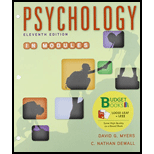
Concept introduction: Behavior is the capacity of an animal to learn through experience. Conditioning is used to learn behavior in which response becomes more frequent or more predictable. This is achieved as a result of reinforcement of stimulus for a desired response.
Answer to Problem 15TYS
Correct answer: Garcia and Koelling’s taste aversion studies showed that conditioning can occur when the unconditioned stimulus (US) does not immediately follow the neutral stimulus.
Explanation of Solution
Neutral stimulus is the stimulus that elicits no response. When neutral stimulus used together with unconditioned stimulus produces a conditioned stimulus in classical conditioning. Taste aversion is the learned response to eat toxic food. When the aversion takes place, the habit of eating a spoiled food is avoided completely. Psychologists Garcia and Koelling hypothesized rats before experiencing radiation, sweetened water is neutral stimulus that cause no response. Thus, radiation is the unconditioned stimulus. The illness caused is the unconditioned response. When they are exposed to radiation, the radiation long with sweetened water becomes conditioned. The illness caused by this conditioned stimulus is conditioned response. Thus, the rats avoided the sweetened water when they are exposed to radiation. Thus, the conditioning occur when the unconditioned stimulus (US) does not immediately follow the neutral stimulus.
Want to see more full solutions like this?
Chapter 23 Solutions
Loose-leaf Version for Psychology in Modules
- How can social workers contribute to prison or criminal justice reform efforts and initiatives? Please cite in text source and list references.arrow_forwardCriminological theory support drunk driving appropriatenessarrow_forwardthe capacity to still feel wonder in essential for the creative processarrow_forward
- How does music influence your emotions? Can you recall a specific song or piece of music that has evoked strong emotions in you? What was it about that music that elicited such a response? Instructions: Recall a song that evoked strong emotions What emotions did the song help you feel? and why? Are there specific musical elements (e.g., melody, rhythm, harmony, lyrics) that you find particularly powerful in shaping emotional experiences? How do these elements contribute to the overall emotional impact of a piece of music?arrow_forwardAnalyzed the relevant state or federal policies and drunk driving related to criminological theory, focus on specific needs of the public and the relevant branch of the criminal justice system in the center of the departmental policy justifying your identicationsarrow_forwardn which sentence is the comma optional? Zach, no doubt, has a reasonable explanation for not setting the table for dinner. Since I grew up in a nearby community, I would prefer to live near Topeka, Kansas. Let’s get an opinion from Emily Bassett, who has experience in training others. Before reading the sign, I didn’t guess that the gadget on the counter was a toaster.arrow_forward
- How does poverty affect people? How does poverty affect our society? Do you think anti-poverty strategies are an important part of a social welfare system? Why? Please cite in text source and list referencesarrow_forwardGiven the following request to an AI chatbot, which response is better? (You can use Google to check the accuracy of each response.) Prompt Write a love poem about someone longing for a sandwich. Make it a sonnet, and give it a tone that straddles a serious love poem and whimsy appropriate for a poem about a sandwich. Response Response A Response B Oh, sandwich, where art thou, my bread?I love you, your ham, your cheese.My stomach rumbles and my tummy grumbles.I can’t wait for you to fill my belly!The lettuce is crisp and crunchy.The tomatoes are red and sweet.The mustard is spicy!The bread is soft and yummy.Between two slices, I found paradise.It’s like an orgasm for my soul, and I cry at the sweetness.It’s a simple and deeply profound pleasure.It abates my hunger and gives my muscles fuel.Thank you for nourishing me.With every bite, joy does resound. In famished depths, I pine upon my bed,Sweet thoughts of thy most holy meat and breadDrift through my mind like a…arrow_forwardI need help with this assignment I need help finding articles for this research question Evolutionary psychology & Body Modifications (piercings, tattoos, bodybuilding, cosmetic surgery)arrow_forward
 Ciccarelli: Psychology_5 (5th Edition)PsychologyISBN:9780134477961Author:Saundra K. Ciccarelli, J. Noland WhitePublisher:PEARSON
Ciccarelli: Psychology_5 (5th Edition)PsychologyISBN:9780134477961Author:Saundra K. Ciccarelli, J. Noland WhitePublisher:PEARSON Cognitive PsychologyPsychologyISBN:9781337408271Author:Goldstein, E. Bruce.Publisher:Cengage Learning,
Cognitive PsychologyPsychologyISBN:9781337408271Author:Goldstein, E. Bruce.Publisher:Cengage Learning, Introduction to Psychology: Gateways to Mind and ...PsychologyISBN:9781337565691Author:Dennis Coon, John O. Mitterer, Tanya S. MartiniPublisher:Cengage Learning
Introduction to Psychology: Gateways to Mind and ...PsychologyISBN:9781337565691Author:Dennis Coon, John O. Mitterer, Tanya S. MartiniPublisher:Cengage Learning Psychology in Your Life (Second Edition)PsychologyISBN:9780393265156Author:Sarah Grison, Michael GazzanigaPublisher:W. W. Norton & Company
Psychology in Your Life (Second Edition)PsychologyISBN:9780393265156Author:Sarah Grison, Michael GazzanigaPublisher:W. W. Norton & Company Cognitive Psychology: Connecting Mind, Research a...PsychologyISBN:9781285763880Author:E. Bruce GoldsteinPublisher:Cengage Learning
Cognitive Psychology: Connecting Mind, Research a...PsychologyISBN:9781285763880Author:E. Bruce GoldsteinPublisher:Cengage Learning Theories of Personality (MindTap Course List)PsychologyISBN:9781305652958Author:Duane P. Schultz, Sydney Ellen SchultzPublisher:Cengage Learning
Theories of Personality (MindTap Course List)PsychologyISBN:9781305652958Author:Duane P. Schultz, Sydney Ellen SchultzPublisher:Cengage Learning





